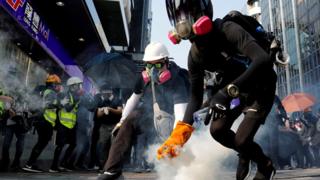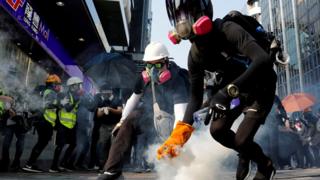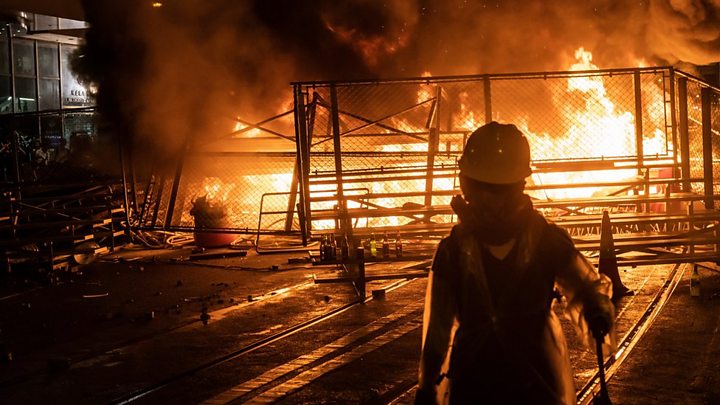Hong Kong protests: Trump signs Human Rights and Democracy Act into law
The Human Rights and Democracy Act has angered Beijing, and could complicate US-China trade talks. …

 Image copyright Reuters
Image copyright Reuters US President Donald Trump has signed into law a bill that supports pro-democracy protesters in Hong Kong.
The Human Rights and Democracy Act mandates an annual review, to check if Hong Kong has enough autonomy to justify its special status with the US.
Mr Trump said he signed the law “out of respect for President Xi [Jinping], China, and the people of Hong Kong”.
Hong Kong’s government said the bill would send the wrong signal and would not help to ease the situation.
And China’s foreign ministry said it would take “firm counter measures” – accusing Washington of “absolutely sinister intentions”.
Chinese state media said the bill was “unnecessary and groundless, and will damage exchanges between the region and the US”.
Mr Trump is seeking a deal with China, in order to end a damaging trade war between the two countries.
Mr Trump had previously been noncommittal about whether he would sign the bill, saying he was “with” Hong Kong but that Mr Xi was also “an incredible guy”.
However, the bill had widespread congressional support, which meant that even if he vetoed it, lawmakers could potentially have voted to overturn his decision.
The president also signed a second bill, which bans the export of crowd-control munitions to the police in Hong Kong – including tear gas, rubber bullets and stun guns.
“[The bills] are being enacted in the hope that leaders and representatives of China and Hong Kong will be able to amicably settle their differences, leading to long-term peace and prosperity for all,” Mr Trump said.
What does the law say?
The bill was introduced in June in the early stages of the protests in Hong Kong, and was overwhelmingly approved by the House of Representatives last month.
It says: “Hong Kong is part of China but has a largely separate legal and economic system.
“The [annual review] shall assess whether China has eroded Hong Kong’s civil liberties and rule of law as protected by Hong Kong’s Basic Law.”
Among other things, Hong Kong’s special trading status means it is not affected by US sanctions or tariffs placed on the mainland.
The bill also says the US should allow Hong Kong residents to obtain US visas, even if they have been arrested for being part of non-violent protests.
What is the situation in Hong Kong?
Hong Kong’s protests started in June against a proposed law to allow extradition to mainland China but it has since transformed into a larger pro-democracy movement.
The protests have also seen increasingly violent clashes, with police being attacked, and officers firing live bullets.
Protesters have thrown petrol bombs and attacked businesses seen as being pro-Beijing.
The protesters, meanwhile, have accused police of brutality.
On Sunday, Hong Kong held local council elections that were seen as a barometer of public opinion towards the government and the protesters.
The elections saw a landslide victory for the pro-democracy movement, with 17 of the 18 councils now controlled by pro-democracy councillors.

Media playback is unsupported on your device




